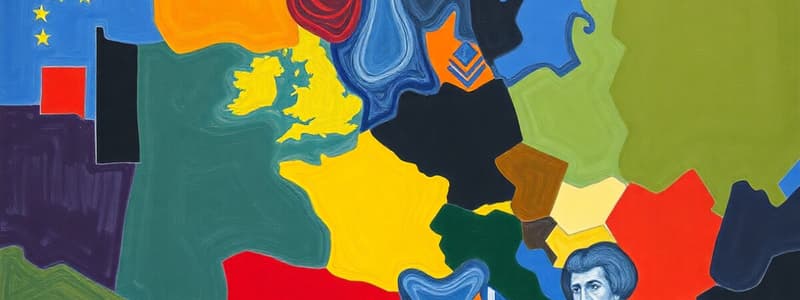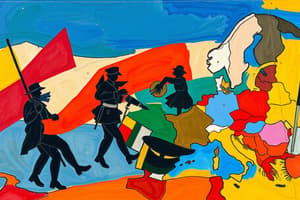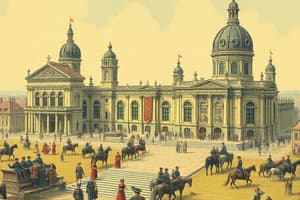Podcast
Questions and Answers
What was the impact of the war on gender roles in society?
What was the impact of the war on gender roles in society?
- Men returned from war to find no changes in social structures.
- Gender roles remained strictly traditional during the war.
- The war created opportunities for women in the workforce. (correct)
- Women were discouraged from entering the workforce.
Which battle is associated with a significant German victory on the Eastern Front?
Which battle is associated with a significant German victory on the Eastern Front?
- Battle of Marne
- Battle of Verdun
- Battle of Tannenberg (correct)
- Battle of Somme
What major turning point occurred in 1917 that impacted the war?
What major turning point occurred in 1917 that impacted the war?
- The entry of the United States into the war. (correct)
- The Battle of Verdun ended in a stalemate.
- The signing of the Treaty of Versailles.
- The outbreak of the Russian Revolution.
What was one of the consequences of the Treaty of Versailles?
What was one of the consequences of the Treaty of Versailles?
Which battle was NOT noted for immense casualties with little territorial gain?
Which battle was NOT noted for immense casualties with little territorial gain?
What event triggered the onset of World War I?
What event triggered the onset of World War I?
Which two factions were primarily involved in World War I?
Which two factions were primarily involved in World War I?
What characterized the nature of warfare during World War I?
What characterized the nature of warfare during World War I?
Which of the following was NOT a result of World War I?
Which of the following was NOT a result of World War I?
What major political shift occurred as a result of World War I?
What major political shift occurred as a result of World War I?
What role did nationalism play in the tensions leading to World War I?
What role did nationalism play in the tensions leading to World War I?
Which new military technology significantly changed warfare during World War I?
Which new military technology significantly changed warfare during World War I?
What was a consequence of the Treaty of Versailles?
What was a consequence of the Treaty of Versailles?
Flashcards
Prelude to World War I
Prelude to World War I
A tense situation in Europe before 1914 where many countries had conflicts, alliances, and ambitions.
Nationalism in World War I
Nationalism in World War I
A strong feeling of national pride and unity that played a big part in the tensions between nations.
Militarism before World War I
Militarism before World War I
A race to build up armies and weapons, creating a climate of fear and mistrust.
Imperial Rivalries before World War I
Imperial Rivalries before World War I
Signup and view all the flashcards
Assassination of Archduke Franz Ferdinand
Assassination of Archduke Franz Ferdinand
Signup and view all the flashcards
Alliance System in World War I
Alliance System in World War I
Signup and view all the flashcards
Central Powers and Allied Powers
Central Powers and Allied Powers
Signup and view all the flashcards
Trench Warfare
Trench Warfare
Signup and view all the flashcards
Lost Generation
Lost Generation
Signup and view all the flashcards
Battle of Verdun
Battle of Verdun
Signup and view all the flashcards
US Entry in WWI
US Entry in WWI
Signup and view all the flashcards
Treaty of Versailles
Treaty of Versailles
Signup and view all the flashcards
Redrawing of Europe
Redrawing of Europe
Signup and view all the flashcards
Study Notes
Prelude to War
- A complex network of alliances, rivalries, and imperial ambitions fostered a volatile atmosphere in Europe before 1914.
- Nationalism, driven by shared ethnic and cultural identities, fueled tensions between nations.
- Militarism, characterized by an arms race and a culture of aggressive nationalism, contributed to widespread distrust and fear.
- Imperial rivalries among European powers intensified competition for resources and influence.
- The assassination of Archduke Franz Ferdinand of Austria-Hungary by a Serbian nationalist ignited a chain reaction, ultimately leading to war.
Key Events and Players
- The assassination of Archduke Franz Ferdinand, heir to the Austro-Hungarian throne, occurred on June 28, 1914.
- Austria-Hungary's subsequent ultimatum to Serbia triggered a series of declarations of war.
- The interconnected web of alliances rapidly escalated the conflict from a regional dispute to a continental war.
- The Central Powers (Germany, Austria-Hungary, the Ottoman Empire, and Bulgaria) confronted the Allied Powers (France, Great Britain, Russia, Italy, Japan, and later the United States).
- Key figures included Kaiser Wilhelm II of Germany and Tsar Nicholas II of Russia, among other national leaders.
Characteristics of the War
- Trench warfare characterized the Western Front, marked by stalemate and immense loss of life.
- Technological advancements, like machine guns, poison gas, tanks, and airplanes, dramatically reshaped warfare.
- Widespread civilian mobilization contributed to war production and support efforts.
- The conflict extended beyond Europe, encompassing colonial territories and other world regions.
- The war's brutality and devastation profoundly impacted both battlefields and civilian populations.
Impact of World War I
- Millions of casualties on both sides, severely affecting civilian populations.
- The war sparked significant political shifts and revolutions, including the Russian Revolution of 1917.
- The Treaty of Versailles, signed in 1919, concluded the war but imposed harsh penalties on Germany, contributing to European instability.
- The war profoundly altered social and economic landscapes in participating countries.
- The war's devastation and disillusionment had a lasting impact on European society and culture, fostering the "Lost Generation."
Key Battles and Turning Points
- The Battles of Marne, Verdun, and Somme on the Western Front resulted in massive casualties but limited territorial gains.
- The Battle of Tannenberg on the Eastern Front represented a significant German victory.
- The United States' entry in 1917 provided critical resources and manpower to the Allied forces, marking a turning point.
- The 1918 German Spring Offensive, while initially successful, ultimately failed to break the stalemate on the Western Front.
Homefront Experiences
- Governments implemented extensive measures to mobilize economies for war, including rationing and the development of new industries.
- Propaganda played a crucial role in shaping public opinion and maintaining national morale.
- Women took on greater roles in the workforce as men were deployed, affecting gender roles and social structures.
- Civilian populations faced widespread suffering and hardship during the war.
Aftermath and Conclusion
- The war reshaped the European map and led to the collapse of several empires.
- The Treaty of Versailles, while intended to establish peace, fostered resentment and instability in Europe, contributing to the rise of extremist ideologies and World War II.
- The global balance of power fundamentally shifted as a result of the war.
- The war's repercussions continue to influence international relations and global affairs today.
Studying That Suits You
Use AI to generate personalized quizzes and flashcards to suit your learning preferences.



